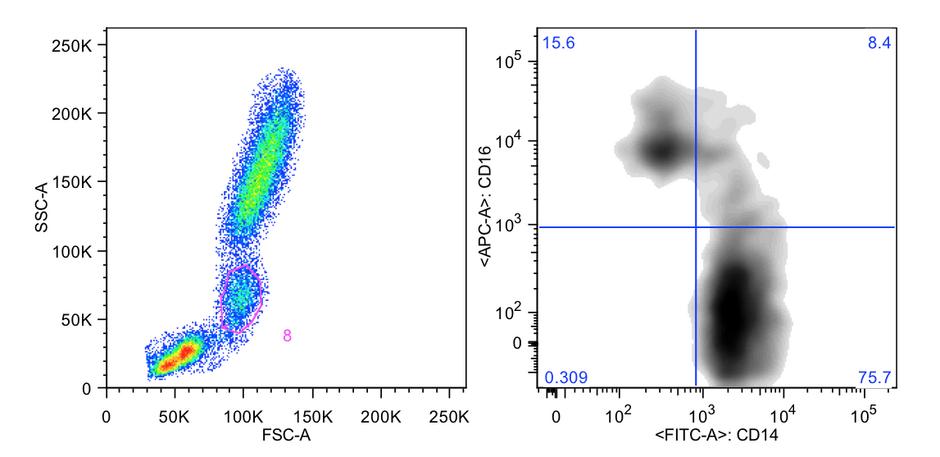
Zelluläre Komponenten der angeborenen Immunantwort
Immunologie von Monozyten
Monozyten sind ein zentraler Bestandteil der angeborenen Immunität und bilden unterschiedliche Subtypen, die für fast jeden Schritt einer Immunreaktion essenziell sind. Monozytäre Zellen regulieren nicht nur Reaktionen der angeborenen Immunantwort, wie die Abwehr gegen infektiöse Erreger und die Initiierung von Endzüngsreaktionen, sondern sind auch entscheidend an der Entstehung und Regulation von adaptiven Immunantworten (wie z.B. T-Zellen und B-Zellen) beteiligt. Für humane und für murine Monozyten sind diverse Aktivierungs- und Differenzierungs-abhängige Monozyten-Subtypen beschrieben worden. Unsere Arbeitsgruppe beschäftigt sich mit der Biologie dieser Monozyten-Subtypen. Wir charakterisieren solche Monozyten-Subtypen und untersuchen deren Bedeutung für das gesamte Immunsystem. Darüber hinaus untersuchen wir, ob bestimmte Formen von Monozyten eine Bedeutung für therapeutische Ansätze entzündlicher Erkrankungen haben.
Cordes F, Lenker E, Weinhage T, Spille LJ, Bettenworth D, Varga G, Schmidt HH, Foell D. (2020) Impaired IFN-γ-dependent STAT3 Activation Is Associated With Dysregulation of Regulatory and Inflammatory Signaling in Monocytes of Ulcerative Colitis Patients.Inflammatory Bowel Diseases. doi:10.1093/izaa280
Cordes F, Foell D, Ding JN, Varga G, Bettenworth D. (2020) Differential regulation of JAK/STAT-signaling in patients with ulcerative colitis and Crohn's disease. World J Gastroenterol. doi: 10.3748/wjg.v26.i28.4055
Cordes F, Lenker E, Spille LJ, Weinhage T, Bettenworth D, Kessel C, Schmidt HH, Foell D, Varga G. (2020) Tofacitinib Reprograms Human Monocytes of IBD Patients and Healthy Controls Toward a More Regulatory Phenotype. Inflamm Bowel Dis. doi: 10.1093/ibd/izz213
Varga G, and Foell D (2018) Anti-inflammatory monocytes – interplay of innate and adaptive immunity. Molecular and Cellular Pediatrics. doi.org/10.1186/s40348-018-0083-4
Dabritz J, Weinhage T, Varga G, Wirth T, Ehrchen JM, Barczyk-Kahlert K, Roth J, Schwarz T and Foell D (2016) Activation-dependent cell death of human monocytes is a novel mechanism of fine-tuning inflammation and autoimmunity. Eur J Immunol 46:1997-2007. doi: 10.1002/eji.201545802
Varga G, Gattorno M,Foell D and Rubartelli A (2015) Redox distress and genetic defects conspire in systemic autoinflammatory diseases. Nat Rev Rheumatol 11:670-80. doi: 10.1038/nrrheum.2015.105
Weinhage T, Däbritz J, Brockhausen A, Wirth T, Brückner M, Belz M, Foell D and Varga G (2015) Granulocyte Macrophage Colony-Stimulating Factor–Activated CD39+/CD73+ Murine Monocytes Modulate Intestinal Inflammation via Induction of Regulatory T Cells. CMGH Cellular and Molecular Gastroenterology and Hepatology 1:433-449.e1. doi: 10.1016/j.jcmgh.2015.04.005
Varga G, Ehrchen J, Brockhausen A, Weinhage T, Nippe N, Belz M, Tsianakas A, Ross M, Bettenworth D, Spieker T, Wolf M, Lippe R, Tenbrock K, Leenen PJ, Roth J and Sunderkotter C (2014) Immune suppression via glucocorticoid-stimulated monocytes: a novel mechanism to cope with inflammation
Immunology of monocytes
Differentiation-dependent subpopulations of monocytes have been defined already at the level of circulating monocytes in the human system and also in the murine system. Reflected by their expression level of CX3CR1, and CCR2 (and in mice also of Ly6C) monocytes either represent a subtype which selectively migrates into inflamed tissue or which forms tissue macrophages and dendritic cells under steady state conditions. However,monocytes itself can be driving force of inflammation but also regulators of overwhelming inflammatory reactions even without prior differentiation into macrophage or dendritic cell. Our group is interested in 1) early events of monocyte activation and how monocytes contribute to initiation of inflammation, 2) how monocytes can also be regulators of inflammation, and 3) how monocytes interact with other immune cells, especially cells of the adaptive immune response.
Kontakt/Teamleitung

Priv.-Doz. Dr. rer. nat. Georg Varga
Postdoc, Arbeitsgruppenleiter, Labormanagement
Members und Alumni
Members:
- Susanne Schleifenbaum, MTA
- Herrn Pascal Hauser, MA
Alumni:
- Doreen Averbeck (Med. Doktorandin)
- Lea Spille (MD)
- Janek Waldkirch (MD)
Klinik für Pädiatrische Rheumatologie und Immunologie
Albert-Schweitzer-Campus 1,
Gebäude W30
(Bereich der Zahnklinik)
48149 Münster

